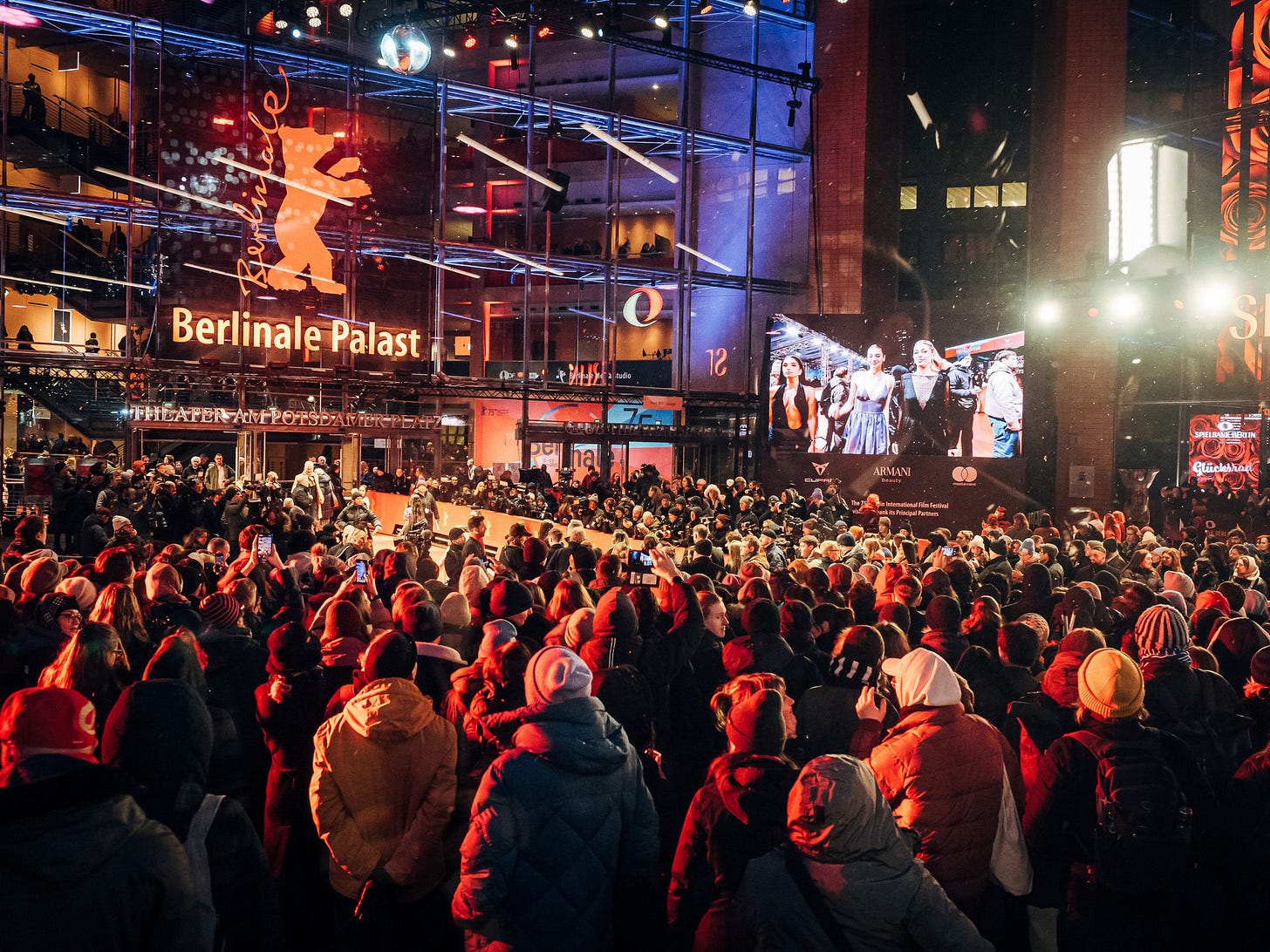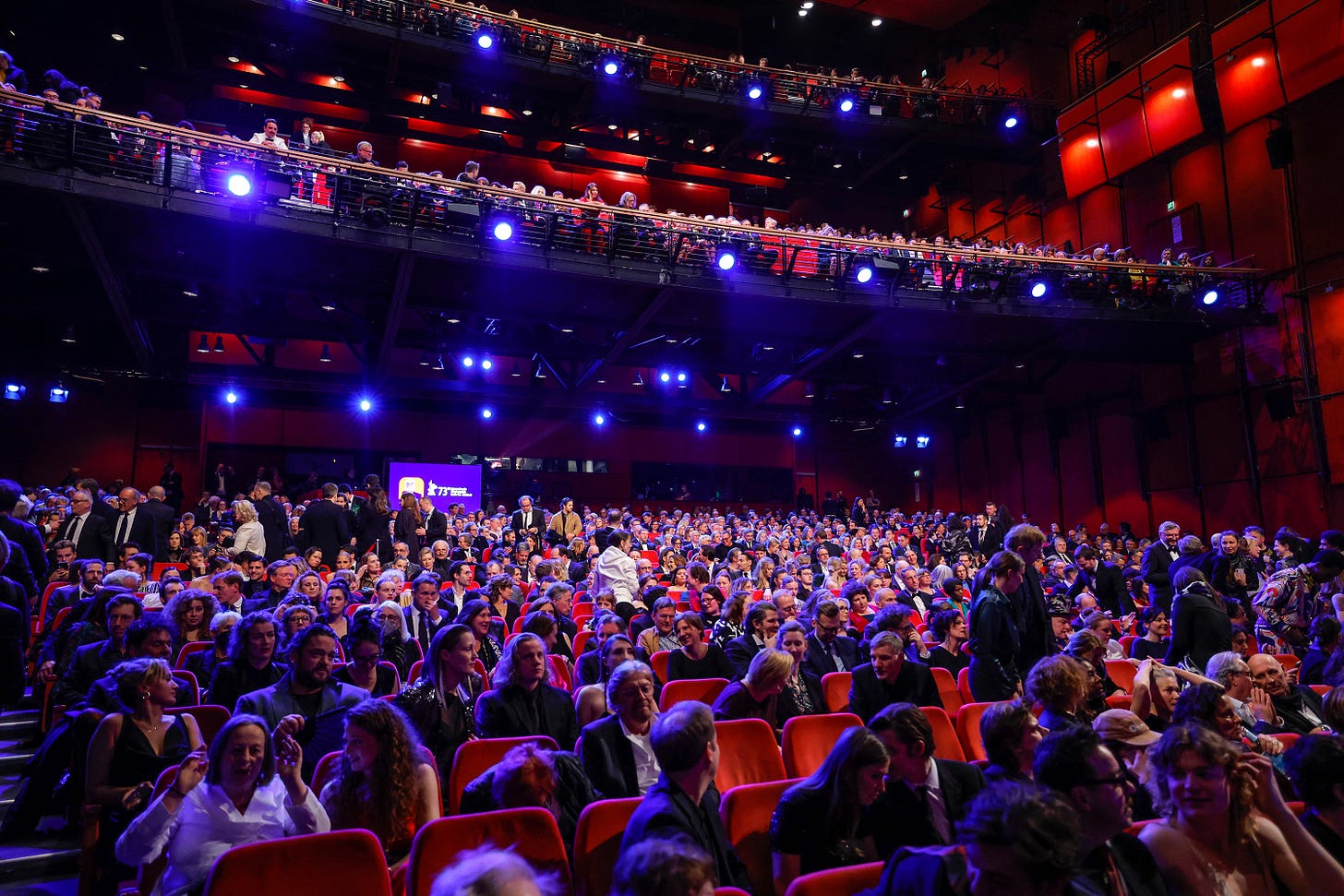The Berlinale is becoming a second-tier film festival
Once a top film festival, the Berlinale is losing relevance. Political censorship, fewer premieres, and dwindling support have weakened its global standing.
The Berlinale used to be one of the three (Venice and Cannes) big international film festivals. This is because:
Claudia Roth, Germany’s Cultural Minister, sacked the previous two directors and brought in the more commercial-friendly American, Tricia Tuttle.
Tuttle’s job is to bring in big sponsors and big world premieres, neither of which happened.
Last year a Palestinian (Basel Adra) and Israeli (Yuval Abraham) won awards but were publicly denounced by Roth and Berlin Mayor Kai Wegner for Abraham’s comments about the apartheid in Gaza.
Given Germany's history of using law enforcement to suppress pro-Palestinian demonstrations and speech, many filmmakers have become wary of participating in the festival.
Lo and behold, a filmmaker is now under investigation for reading out a message from an actor in his film that included the phrase, “river to the sea”.
There is a noticeable decline in business and overall enthusiasm among film market attendants, critics, and film industry insiders.
Perhaps, I think, the most important reason: the Berlinale, which brands itself the “political film festival” collided with real-world politics and imploded, which discredited its identity and overall raison d'être.

The politics of it all
I keep going on and on about what it means for the Berlinale to be “political”. It’s also a question posed to jury members and the last two Berlinale directors, who usually respond: “We’ll see in the movies”.
But what happens when politics happens in real life, something that tends to happen from time to time?
This year the Berlinale was hit with a double-punch: federal elections will happen on the final day of the festival, and many Berliners, filmmakers, and film industry people in general are displeased with German censorship of pro-Palestinian demonstrations/speech.
The center-left SPD party came to power in 2021, leading a weak coalition with the Greens and FDP. Several months later, Putin invaded Ukraine, Americans destroyed the Nord Stream pipelines, energy costs soared, and economic instability followed. This led to a swift swing back towards the CDU/CSU, currently the only party polling ahead of the far-right AfD. Germans are increasingly anxious about their own versions of Trump/Musk gaining power very soon.
In Berlin, under CDU Mayor Kai Wegner, censorship of pro-Palestinian phrases and events has intensified since October 7th. Wegner publicly expressed hope that Berlinale’s new director (then expected to be Tuttle) would prevent “anti-Semitic” remarks from overshadowing the festival. His comments specifically referred to an Abraham, who co-directed No Other Land, a film about Israel’s illegal destruction of Masafer Yatta in the West Bank.
In response, a decline in filmmakers willing to attend a festival that neither prioritizes artistic freedom nor supports their business interests. No Other Land struggled for months to find distribution—despite receiving an Oscar nomination.
To Tuttle’s credit, she publicly defended Abraham’s right to make his comments, unlike her predecessors. However, she participated in a pro-Israeli moment on the red carpet (that I watched from five feet away), promoting the premiere of a documentary about one of the Israeli prisoners as an obviously lame way of trying to move past last year’s drama.
Tuttle clearly feels the pro-Israel political pressure from above, and pro-Palestinian pressure from below:
She has said that the impression Germany is giving with regards to controlling free speech on the Middle East conflict is directly affecting her first edition in charge, and that there are fears that criticism of Israel would be condemned as antisemitism in Germany.
She was right, as we saw regarding Hong Kong filmmaker Jun Li. During the premiere of Queerpanorama, Jun Li read a speech by Iranian actor Erfan Shekarriz, who boycotted the festival in protest of its stance on Palestine. The speech included:
Whilst you watch this movie, millions of Palestinian people are suffocating under the cruel settler-colonial regime of Israel supported by the West. The German government and its cultural organizations like the Berlinale are contributing in some way or other to the apartheid genocide and ruthless killing and annihilation of the Palestinian people.
And ended with the criminally punishable phrase, “from the river to the sea, Palestine will be free.” The State Security Police of the Federal Criminal Police Office, which is responsible for political crimes, is now investigating the “incident”.
What hasn’t been widely reported is that many other filmmakers are expressing pro-Palestinian solidarity during post-screening Q&As. Of the five filmmakers I saw speak, three made remarks opposing the colonization and occupation of Gaza, deliberately avoiding the “river to sea” phrase. Tuttle had explicitly warned filmmakers about Germany’s censorship policies, likely leading to self-censorship and carefully worded statements.
Regarding the Queerpanorama incident, Berlinale management responded:
We were aware that the team wanted to make a statement. All of our guests, including the film team of this film, have been made aware that there are phrases which are particularly sensitive or which have been prosecuted in some states in Germany. In addition, we pointed out to all teams, including this one, the general sensitivity of language, even if covered by the individual’s freedom of expression.
Grim.
Tuttle has repeatedly emphasized, in public press quotes and the Berlinale website, that free speech is a core principle of the festival. Not only is that just a lame American position that means nothing, but it becomes 1984ish when one’s “sensitive language” is being censored for sensitivity in the wrong direction.
Tilda Swinton, this year’s Golden Bear recipient and known supporter of the BDS movement, delivered a speech against occupation and colonization but didn’t directly name Israel. Nonetheless, Israeli and Zionist organizations condemned the speech, interpreting it as a direct criticism. (Reminds me of the dumbass comments made by right-wingers, who were concerned upon suddenly losing thousands of followers at once – of course first blaming the liberals leading twitter at the time – after twitter deleted the profiles of thousands of neo-nazi accounts.)
With the awards ceremony and final weekend still ahead, it remains unclear how this year’s controversies will unfold.
The Berlinale relegated
Another point to mention before catching my 10pm Friday viewing is that there were noticeably less big names and big premieres this year. While this isn’t as concerning as filmmakers giving up freedom of expression to sell their wares, it is what distinguishes Cannes, Venice, and now Toronto, from all the rest. It’s the difference between being an international festival and a regional festival. One that participates in the elitism of the global film market and one that picks up their scraps afterwards.
Whether one likes it or not, major premieres and big sponsors provide the revenue necessary to sustain a festival’s stature. If Berlinale continues on its current trajectory—fewer prominent sponsors, fewer high-profile films, and increasing restrictions on free expression—it risks becoming a second-rate festival.
Or perhaps it already is, and I’ve just been too busy naively watching films to notice.
Stayed tuned (and subscribe) for more updates from Berlinale! I will have more “light-hearted” (aka non-political) ones next time reviewing films.



